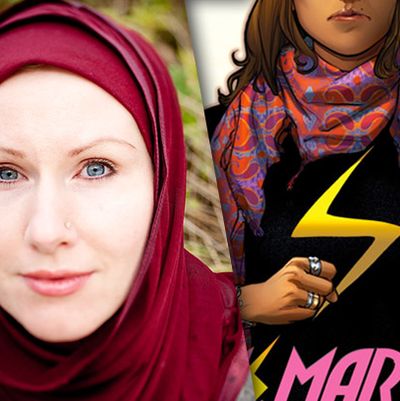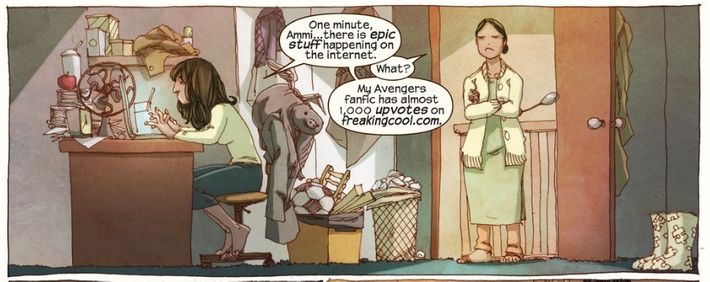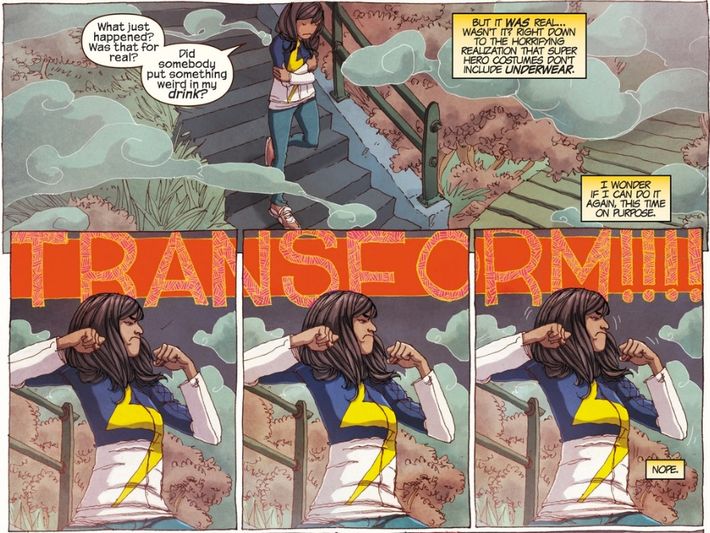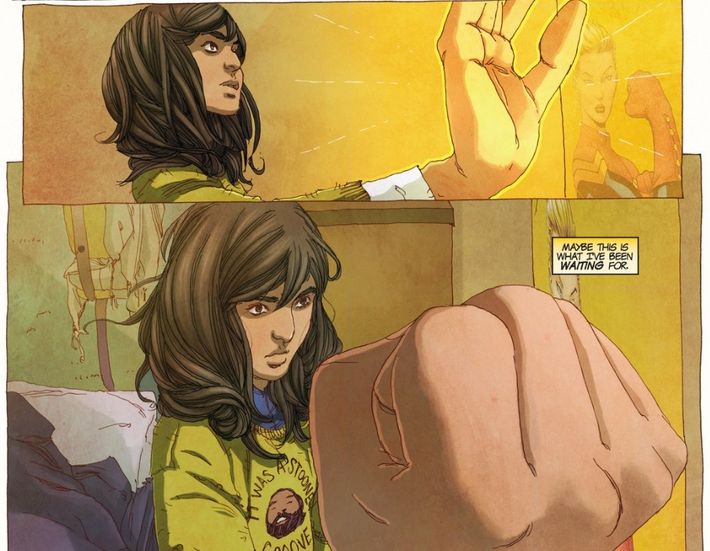
This interview originally ran in 2014 following Kamala Khan’s comic-book debut. Vulture is revisiting it now in honor of Kamala’s entry into television with Ms. Marvel, which builds on the characterization established in the comics by G. Willow Wilson (who is not otherwise involved with the series, save for a wink in the form of a character name).
Superhero comics are built on amazing feats: flying, climbing walls, transforming into a giant green monster while somehow keeping your purple shorts on. But G. Willow Wilson has done something even Superman never bothered to do: create a female Muslim superhero and turn her into an overnight marketing sensation.
Wilson writes Ms. Marvel, a monthly Marvel Comics series that debuted in February. It stars Kamala Khan, a 16-year-old child of Pakistani immigrants living in Jersey City (well, the Marvel universe’s version of Jersey City, where Iron Man, Captain America, and the like battle bad guys just across the Hudson). Kamala is a hero in the Peter Parker tradition: dweeby, self-doubting, unpopular. Like so many of today’s teen geeks, she spends her nights resenting her parents and writing fan fiction for online forums. A bizarre incident leaves Kamala with shapeshifting powers, and even though we’re only on issue No. 2 (both issues are on sale now), the character has caused a remarkable uproar of support: Kamala already has a devoted online following, has coverage in major media outlets, and is selling in droves.
And yet, lost in all that clamor is the remarkable story of Wilson, the writer behind Kamala. Born in New Jersey herself, Wilson was a white kid with no religious upbringing, but converted to Islam during the height of the War on Terror. She’s lived in Egypt, done foreign correspondence for the New York Times, penned a memoir, written an acclaimed novel, and labored in relative obscurity within the mainstream comics industry for years. But now that she has a bona fide hit on her hands, we reached out to her to talk about her unusual life, the struggle to make comics more inclusive, and why Islam and geekdom make a perfect pairing.
What’s surprised you most about the media and reader response to Ms. Marvel?
Well, I have never, ever before written any comic book where there was fan art before the book was even released. That has never happened to me. That really — that really floored me. As soon as we started releasing character designs, there was stuff on Twitter, Tumblr, T-shirts … it was amazing. Despite all the criticisms that have been leveled at the comics community, both in terms of fans and creators, I have always felt more comfortable and accepted in the comics community than I have in any other medium of publishing that I’ve had the pleasure of working in. And it’s because it’s a fringe medium! We’re used to, on some level, grappling with ideas that the mainstream doesn’t wanna grapple with. I mean, you look back at Sandman [which began publication in 1989], for example: There were positive portrayals of gay relationships in Sandman years before they occurred in mainstream television. In comics, we’re all weird together. I can go to a comics convention and not stand out, even though I’m the only woman in a headscarf there, because the guy next to me has a beard and a Sailor Moon costume.
What’s unique about writing a female Muslim superhero in 2014, as opposed to 10 or 20 years ago?
Well, I think if we had written Ms. Marvel ten years ago, Kamala’s religion would probably have to be an even bigger part of the conversation than it is today, because closer to 9/11, there was a lot more scrutiny placed on the actions of everyday American Muslims. But today, now that there’s a bit of distance — particularly for the younger generation, for whom 9/11 happened when they were small children — there’s a greater desire to see more well-rounded stories. Being a Muslim is really only one part of her overall arc, her overall journey.

In your memoir, The Butterfly Mosque, you wrote that, in Islam, “the things that are most precious, most perfect and most holy are always hidden: the Kaaba, the faces of prophets and angels, a woman’s body, Heaven.” So does Islam lend itself to superhero masks and secret identities?
In a certain sense. Certain writers in the Muslim world have started to make a connection between wearing a mask — as one often does in a superhero costume — and, for example, covering the face. And so we’ve seen, just in the past couple of years, the emergence of two separate veiled superheroines in different parts of the Muslim world. In Egypt, there’s Qahera, who goes around the streets of Cairo defending women from the notorious sexual harassment there. There’s the Burka Avenger in Pakistan, a schoolteacher who dons a burka to fight corruption and religious extremism.
I had absolutely no idea those things existed.
Both were created in the past couple of years. Qahera started in the wake of the revolution in Egypt, and Burka Avenger started maybe a year ago. The cadre of Muslim superhero writers is pretty small. [Laughs.]
Were you part of that cadre before you started doing Ms. Marvel?
You know, I pay attention to the blogosphere and online life of the Middle East and South Asia in the course of my work, but the Ms. Marvel thing came up completely separately. That was a call from two editors at Marvel that came completely out of the blue, who said, “We have this idea: We want to create a young American Muslim female superhero from scratch, would you like to be part of that?” So that was a total coincidence.
How do you keep Kamala’s faith from being a distracting part of a superhero story?
It’s pretty easy, actually. I write about real life as it is lived by the young American Muslim women that I’ve had the pleasure of meeting throughout the course of my travels as a writer and being able to speak in different places and meet different people at signings and things.
In that case, let’s flip the question on its ear. Do you pressure yourself to write Islamic aspects into your scripts?
Not particularly. Again, we were going for authenticity. For example: We very early on decided she was not going to cover her hair — simply because the majority of American Muslim women don’t cover their hair.

Kamala’s an avid fan-fiction writer. Why did you put that into the story?
Being a Muslim in America, I’ve noticed that there’s a ton of crossover between the Muslim community and geekdom. Part of that is outsider culture: When you’re growing up as a minority and you feel somewhat alienated from the mainstream, you’re going to seek out other people who feel that way. That’s what geek culture is traditionally about.
And also, I wanted her to be fleshed out and have a real personality, rather than being a model minority. Plus, if you lived in a world where there were actual superheroes? Especially in a place like Jersey City, where you’d literally probably see Daredevil in the streets or Thor flying overhead or whatever. It made sense to me, in that situation, that Kamala would grow up looking up to these actual real-world superheroes and becoming a fan-fic writer.
Even though you and Kamala are both Muslim women, there’s one huge difference between creator and character: You were born outside the faith. How did you end up converting to Islam?
I tried to be an atheist but I just wasn’t very good at it. I grew up without any particular religion. I had no idea, really, what Islam was. I knew maybe a handful of Muslims growing up, but I had no idea what it was all about. So I was exposed to it sort of by accident by studying the Crusades in a history class, ironically. I read the Koran and it was a profoundly moving experience for me. I probably would’ve converted sometime in the fall of 2001, had not a … very particular world event occurred that caused me to rethink my entire attraction to the religion. It took a couple of years of study after that before I was convinced that, in fact, what happened on 9/11 was not endorsed by Islam, that it was in fact criminal according to the religion. At that point, I had an opportunity to move to Egypt [to teach English], which seemed like destiny at work. My only exposure to the religion had been through books, at that point. I had maybe $200 to my name. And it was 2003, the very beginning of the Iraq War.
Ah. So, not exactly a fun year to tell your friends and family you’ve converted to Islam.
[Laughs.] Yeah. Well, I didn’t tell anybody. I kept it a secret for months. I just didn’t want to have that conversation. But once I sat down and thought of it, it was like, There’s no way I can get through 30 days a year of no eating or drinking without people noticing. [Laughs.]

Did you grow up reading comics?
I did, I did. Probably my first crush was Wolverine, from the X-Men. When I was a kid, I at some point was given this ten-page PSA anti-smoking comic in health class. Y’know, someone thinking, “This is how to reach kids!” It was incredibly dumb. It was about this high school track star who takes up smoking, so [X-Men heroes] Storm and Wolverine show up to set him on the right path. It took me years to realize how ironic it is to have chain-smoking Wolverine in an anti-smoking comic. He was like, [growls] “Don’t smoke, bub!”
But what stuck with me was these amazing characters with these costumes who could swoop in and morally adjust the world. In high school, Vertigo Comics — which was the literary comics imprint of DC, of Sandman fame — was just getting started, and I started to think about what it would take to become one of the people who got to make these things.
When did you start to notice that women and minorities were underrepresented in the superhero comics you loved so much?
It never occurred to me as a kid. As a kid, you accept whatever you’re given, and it’s tough to know what you don’t know. But when I got older — I remember, in college, there was a phase when I was lurking online in the very new message board forums that some creators had set up. I noticed that, in order to be taken seriously, many of the female fans had to post boob shots. [Laughs.] This was the way to get attention! I think it’s only really within the last couple of years that the conversation has gone truly mainstream and become something that everybody agrees we all need to tackle together. I think that’s because fandom has reached a critical mass of people who are minorities but who make up a higher and higher percentage of fandom. Nowadays, when you go to a convention, it’s pretty much a 50-50 split between male and female attendees. You have more and more LGBT people who want better and more accurate representation, more and more people of color who are interested in comics.
At the same time, there have been a lot of infamous incidents in the past few years — mainly at Marvel’s rival, DC Comics — that progressive readers have jumped all over. Is there a “one step forward, two steps back” situation here?
Oh, gosh. So many other people have done such a better job of documenting this stuff than I have. Like, there’s a Tumblr called the Brokeback Pose, which is dedicated to archiving every single incidence of comics where a woman is on the cover or a scene with her butt pointing out while she’s looking over her shoulder in an anatomically impossible way, just so there can be a butt shot. And there was, recently, that infamous Superman/Wonder Woman cover where Wonder Woman is wearing this unbelievably tight-fitting leotard and appears to have razor-burn in particularly sensitive areas. [Laughs.] It was like, “Who okayed this coloring job?” It’s about blind spots. Not overt hostility. Everybody wants to believe they’re doing the right thing, but we’re not super-good at looking in the mirror and making an objective call about whether we’re doing that. But with the power of the internet, where everything is critiqued in five minutes, it’s easier to hold up that mirror and say, “Hey, you need to take a second look at this.”
Marvel has made some remarkable strides toward greater inclusivity in their comics in the past few years. In what you’ve seen while working for them, does that appear to be a conscious effort?
I think some of it is coming from the top. They take it so seriously that, just this past year, Marvel launched a bunch of different female-led books. Black Widow has her own book now, Captain Marvel [a series historically starring a man with that title, but now starring a woman named Carol Danvers] has the devoted and incredible “Carol Corps,” which is everywhere. In the case of Ms. Marvel, for example, I would never have dreamed of pitching a concept like that to Marvel, in a million years. [Laughs.] That just never would have occurred to me. So to get a call like that from two very well-respected editors saying, “This is something we want to do” was stunning to me.
Okay, but the real superhero cash cow these days is movies: the Avengers franchise, Christopher Nolan’s Superman/Batman empire, and so on. Still a lot of straight, white, male characters there. Is progress being made toward inclusivity there, too?
Slow change has come to the big screen. I mean, [in the comics,] Nick Fury was not originally an African-American character. Or Heimdall, of course, in Thor [a Norse god played by black actor Idris Elba]. In both of those cases, there’s an initial outrage from a small portion of the fan community, but then there’s a larger outrage over the outrage. Fans saying, “Come on, this is the 21st century.” What’s interesting to me is how fast those changes are accepted, and that’s a good thing. I mean, now, Nick Fury is synonymous with Samuel L. Jackson, even in the comics! Just for self-interest, if nothing else — because comics are a business — it behooves everybody to take a step back and ask, “What can we be doing better?” They don’t want to alienate their readership, surely, and their readership is changing. If they want to stay competitive, they’re going to have to respond to that in some way. Any thought [from fans] of, “This is not for me” or “This only appeals to Muslim girls” can be dispelled by picking up a single issue of the book. When I look at the numbers — which are truly astonishing — that this book has pulled, we would not have been able to do that if the traditional fanboys weren’t onboard. That, to me, is an excellent sign.


